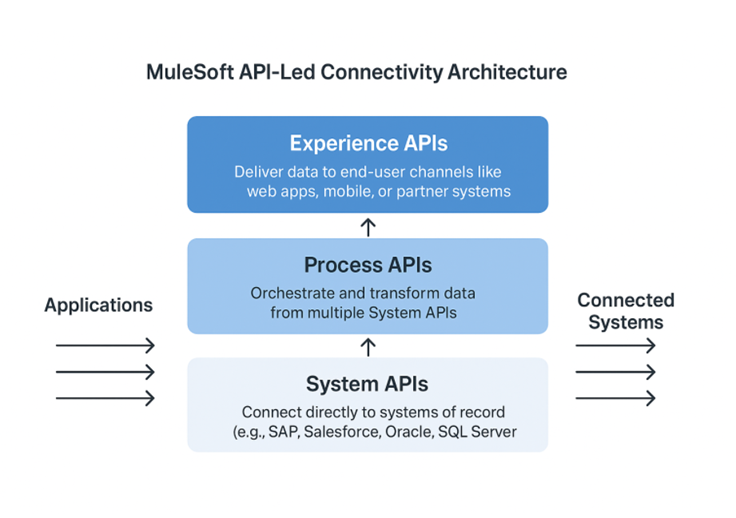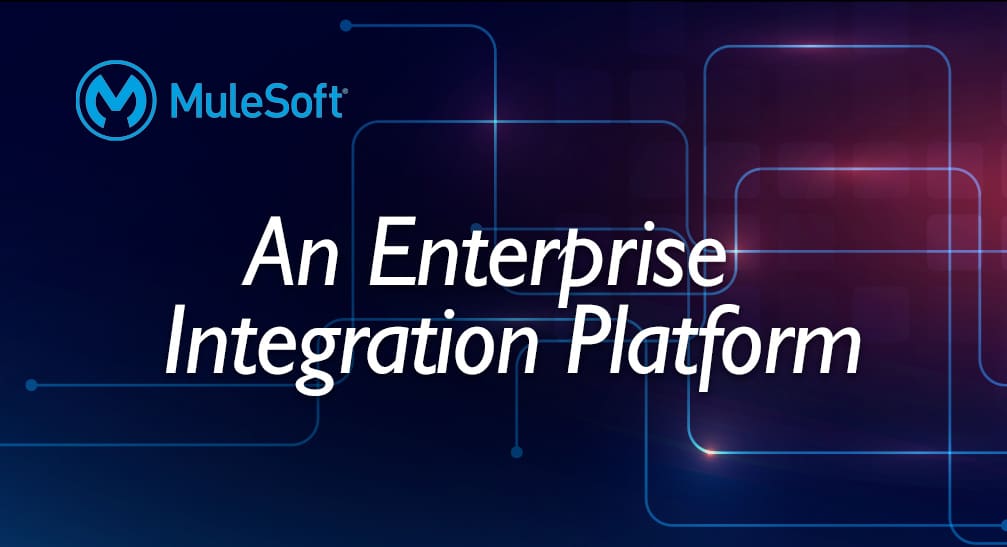In a modern enterprise environment, applications span multiple domains — CRM, ERP, HRM, analytics, and custom business systems — distributed across on-premises data centers, cloud platforms, and SaaS ecosystems.
The challenge: connecting these heterogeneous systems efficiently, securely, and at scale.
MuleSoft Anypoint Platform addresses this by providing a unified integration framework built on API-led connectivity, enabling enterprises to unlock data, accelerate digital transformation, and maintain governance across their integration landscape.
The Enterprise Integration Challenge
Most organizations struggle with:
- Siloed systems: Data trapped across legacy and modern platforms
- Complex point-to-point integrations: Costly to maintain and not scalable
- Slow time-to-market: Each new system connection requires custom development
- Limited visibility: Lack of centralized monitoring and governance
A modern integration approach must deliver reusability, scalability, and observability — while supporting hybrid and multi-cloud environments. MuleSoft delivers exactly that.
MuleSoft’s API-Led Connectivity Architecture
At the heart of MuleSoft’s architecture is API-led connectivity, which organizes APIs into three distinct layers — enabling modular, reusable, and composable integration.

Suggested Layers in Diagram:
- System APIs (Bottom Layer)
- Connect directly to systems of record (e.g., SAP, Salesforce, Oracle, SQL Server)
- Expose core data and functionality securely
- Process APIs (Middle Layer):
- Orchestrate and transform data from multiple System APIs
- Define business logic and workflows (e.g., Order Processing, Customer 360)
- Experience APIs (Top Layer):
- Deliver data to end-user channels like web apps, mobile, or partner systems
- Tailored for each consumer experience
Key Components of MuleSoft Anypoint Platform
- Anypoint Studio: IDE for designing, testing, and deploying Mule applications
- Anypoint Exchange: Central repository for APIs, templates, and connectors
- Anypoint Runtime Manager: Centralized management and monitoring of deployed APIs and integrations
- Anypoint MQ: Message queueing service for reliable, asynchronous communication
- Anypoint API Manager: For API policies, security enforcement, and analytics
- CloudHub / Hybrid Deployment: Flexible deployment model across cloud or on-premise environments
Integration Patterns with MuleSoft
- System Integration – Connect enterprise systems like ERP, CRM, and HCM
- Data Synchronization – Maintain real-time consistency across multiple systems
- Event-Driven Integration – Use message queues and event streams for asynchronous communication
- API Orchestration – Combine multiple APIs to build composite business services
- B2B Integration – Enable partner collaboration via APIs and secure protocols
Example Use Case: Unified Customer Data Platform
Business Need: Aggregate customer data from Salesforce, SAP, and a data warehouse to create a 360° customer view for analytics and marketing.
MuleSoft Solution Architecture:
- System APIs extract data from each source system
- Process API aggregates and normalizes the data
- Experience API exposes unified customer insights to the marketing portal or BI tools
This modular design enables reusability — the same Process API can serve both web and mobile experiences with minimal effort.
Security and Governance
MuleSoft integrates enterprise-grade security through:
- OAuth 2.0 and JWT for secure API authentication
- Policy enforcement via Anypoint API Manager
- Data encryption and masking for sensitive payloads
- Audit logging for compliance (GDPR, HIPAA, etc.)
Additionally, Anypoint Monitoring and Visual Dashboards offer real-time observability into API performance and SLAs.
Why Enterprises Choose MuleSoft
- Scalable API-first integration architecture
- Reduced time-to-market with reusable assets
- Simplified governance and lifecycle management
- Hybrid deployment flexibility (CloudHub, Runtime Fabric, On-prem)
- Native support for CI/CD, DevOps, and API versioning
Exilon Technology: Your MuleSoft Integration Partner
At Exilon Technology, we help enterprises design and implement API-led architectures using MuleSoft Anypoint Platform.
Our expertise spans:
- Integration architecture & API strategy
- Implementation of System, Process, and Experience APIs
- Hybrid deployments and DevOps automation
- Governance, monitoring, and support
Whether you’re modernizing legacy integrations or building a connected digital ecosystem from scratch, Exilon helps you accelerate innovation with MuleSoft.
Let’s Build the Connected Enterprise
With MuleSoft and Exilon Technology, enterprises can unify their applications, data, and devices into one cohesive digital fabric — driving agility, scalability, and business transformation.

